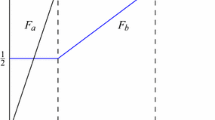This paper addresses two very old issues in human society: espionage and double crossing. Our major conclusion points out that there will be a serious over rewarding problem in the direct mechanism due to double crossing in espionage, and a competitive mechanism with a relative performance regime can possibly mitigate the over rewarding problem and still extract the information.
Similar content being viewed by others
References
Aldrich R (1998) Espionage security and intelligence in Britain 1945–1970. Manchester University Press, Manchester
Arensman R (2001). Shedding the trench coat. Electron Bus 27(9): 70–76
Cho I and Kreps D (1987). Signaling games and stable equilibria. Q J Econ 102: 179–221
Crane A (2005). In the company of spies: when competitive intelligence gathering becomes industrial espionage. Bus Horiz 48(3): 233–240
Daughety A and Reinganum J (2005). Secrecy and safety. Am Econ Rev 95(4): 1074–1092
Dewatripont M (1989). Renegotiation and information revelation over time: the case of optimal labor contracts. Q J Econ 104(3): 589–619
Eichberger J, Grant S and King S (1999). On relative performance contracts and fund manager’s incentives. Eur Econ Rev 43: 135–161
Fellings Z (2001). Sleuth on the loose. Black Enterp 32(1): 62
Fudenberg D and Tirole J (1990). Moral hazard and renegotiation in agency contracts. Econometrica 58(6): 1279–1319
Harris JR (1998) Industrial espionage and technology transfer: Britain and France in the eighteenth century. Ashgate, Aldershot
Hart O, Holmstrom B (1987) The theory of contracts. In: Bewley T (ed) Advances in economic theory. Fifth World Congress. Cambridge University Press, London
Hart O and Tirole J (1988). Contract renegotiation and Coasian dynamics. Rev Econ Stud 55: 509–540
Holmstrom B (1982). Moral hazard in teams. Bell J Econ 13(2): 324–340
Holmstrom B and Milgrom P (1990). Regulating trade among agents. J Inst Theor Econ 146: 85–105
Kreps D and Wilson R (1982). Sequential equilibria. Econometrica 50: 863–894
Laffont JJ and Tirole J (1990). Adverse selection and renegotiation in procurement. Rev Econ Stud 57(4): 597–625
Marenches A (1992) The Fourth World War: diplomacy and espionage in the age of terrorism. Morrow
Masterman JC (1995) The double-cross system, 1939–1945. Pimlico, London
Matsui A (1989). Information leakage forces cooperation. Games Econ Behav 1(1): 94–115
Myerson RB (1979). Incentive compatibility and the bargaining problem. Econometrica 47(1): 61–73
Rositzke H (1988). The CIA’s secret operations: espionage, counterespionage and covert action. Westview Press, Boulder
Sable M (1985). Industrial espionage and trade secrets: an international bibliography. Haworth Press, Binghamton
Saywell T (1999). Private investigations. Far East Econ Rev 162(7): 38–40
Shulsky A, Schmitt G (2002). Silent warfare: understanding the world of Intelligence, 3rd edn. Brassey’s, Washington, DC
Solan E and Yariv L (2004). Games with espionage. Games Econ Behav 47(1): 172–199
Whitney ME and Gaisford JD (1999). Why spy? An inquiry into the rationale for economic espionage. Int Econ J 13(2): 103–123
Author information
Authors and Affiliations
Corresponding author
Rights and permissions
About this article
Cite this article
Ho, S.J. Extracting the information: espionage with double crossing. J Econ 93, 31–58 (2008). https://doi.org/10.1007/s00712-007-0290-2
Received:
Accepted:
Published:
Issue Date:
DOI: https://doi.org/10.1007/s00712-007-0290-2




